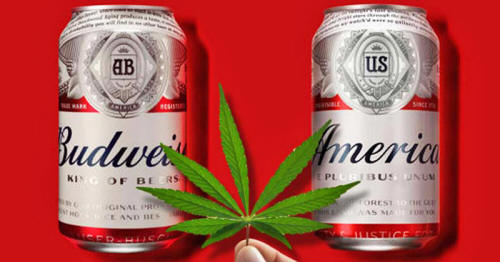|
by Claire Bernish
Budweiser has now oddly yet aptly rebranded itself for the summer, changing its can to read America - but the company's awkward patriotic push belies the reality its product remains the single deadliest substance in the country it now bears on its label:
While canned beer might be perceived as American as, well, just about anything, alcohol,
Worst of all, while Budweiser and other alcoholic mainstays firmly maintain their place as legal - and, indeed, American intoxicants - the drug war rages in full force against what many consider the miracle plant, cannabis.
Despite beer's long and storied history, Americans often don't realize, much less adhere to, limits that would have been acceptable to those who first began brewing it.
Popular rites of passage among youth involve imbibing large quantities of alcohol - and those who succeed in college drinking games are those able to drink enormous quantities without physically succumbing to its detrimental effects.
Alcohol flows more readily than water at sporting events and concerts around the country, yet alcohol-impaired driving stands as one of the biggest killers.
Meanwhile, cannabis - a plant that can not only save lives, it vastly improves them by treating everything from PTSD to epilepsy - inexplicably tops the list of substances prohibited by the government.
In fact, a recent report from AAA's safety foundation found people responsible for deadly automobile accidents due to impairment rarely (1.8%) had only consumed cannabis - and had instead also imbibed alcohol or taken other illicit substances.
As Harold Pollack wrote for the Washington Post,
It isn't a stretch, however, to say America's relationship with alcohol has been a neurotic love affair.
Prohibition brought out the outlaw in almost every member of society - except the most ardent teetotalers. Black markets and speakeasies so exploded during prohibition, its end proved less risky than the drinking it had been banned for in the first place.
Of course, it is our view that prohibition on any level is immoral and unjust. Kidnapping, caging, and killing people for making the personal choice to ingest arbitrary substances is the work of villains and nothing close to 'public service.'
But as beer and other alcoholic drinks now readily flow from the tap, so does better judgment.
Americans get loaded in social gatherings and are more likely to take the wheel of a car or to become violent - or take any number of other serious risks where keen awareness would otherwise prevent such a situation. As Pollack explained, alcohol permeates the bodies of victims nearly as often as it does perpetrators of serious crimes
Yet the federal government stubbornly refuses to budge on policies concerning cannabis.
The drug war has thus overturned logic in favor of Reefer Madness paranoia - the Nixon-era anti-pot campaign recently revealed to have been started simply to demonize both hippies and the black population.
Government's inexcusable refusal to budge on cannabis prohibition proves policy lacks both logic and reason - particularly when compared to risks associated with legal alcohol consumption.
Budweiser's choice to emblazon its cans with 'America' - when presented in contrast to cannabis - seems not only ridiculous but fitting of a government that cares more for profit and image than the wellbeing of its people.
|


